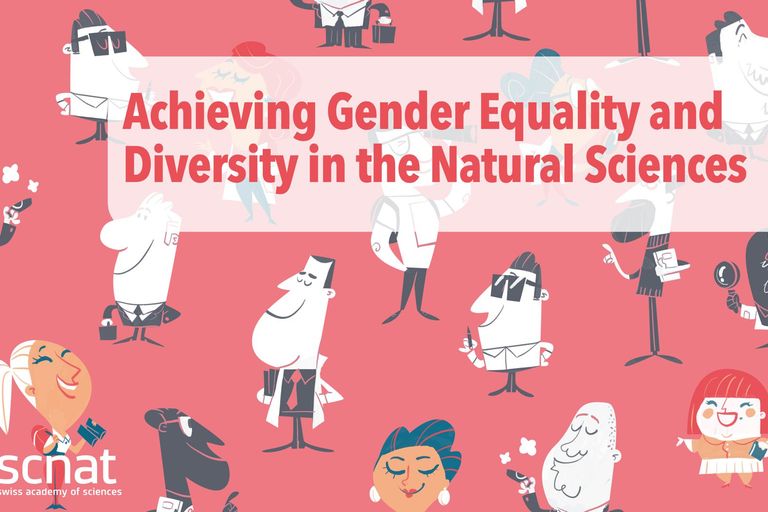“Embracing gender diversity is good for science”
Carte Blanche for Astrid Oberson Dräyer, Carmen Faso, and Didier Picard
18-4-2023 – The expectation that women shall be and act like their male colleagues, especially when it comes to meet excellence criteria, is causing many women to leave science after their PhD or Postdoc. To plug this ‘leaky pipeline’ there is the need for a broader range of accepted career paths, behaviors and work models.

The article reflects the personal opinion of the authors and does not necessarily reflect the position of SCNAT.
There is still an (unconscious) expectation for women to be and act like their male colleagues, especially when it comes to meet excellence criteria. Ironically, this is often seen in the curricula of leadership courses aimed specifically at women in positions of responsibility. Although well-meaning, this targeted approach suggests women need to learn something that their male counterparts are already good at and need no further training on. Defining successful and sustainable leadership models in academia that are mindful of integrity, and focus on attainable and transparent criteria for excellence will provide fairer and more attractive working environments to support cutting-edge science.
Gender equality does not mean gender sameness
We would like to stress that gender equality does not mean gender sameness. Neurobiological differences between women and men exist and the socio-cultural environment further shapes and accentuates gender differences. This underlines the need for diversity and for a broader range of accepted behaviors and work models. Current excellence criteria include competitivity, mobility, science as the only meaningful interest and activity, and sheer unlimited availability for work combined with many years of low-income positions and job insecurity. These unattractive working conditions have historically catered to male academics who in their private life had strong support from their spouses, when not from domestic employees.
Equality is essential for society
Everyone generally agrees that equality, and by this we mean equality of treatment and equality of opportunity, is not only fair but essential for a society to benefit from the diversity of skills and knowledge, independently of gender and background. So why has this highly desirable outcome proven so elusive? What interferes with the establishment of an equitable and diverse academic workforce? And how can we address and ultimately solve this issue?
Possible answers and tangible solutions were explored in a nine-episode webinar series in autumn 2021 organized by the Platform Biology of SCNAT. The overarching topic was the ‘leaky pipeline’ which stands for the decreasing proportion of women from higher-education studies towards advanced and leading positions in research, as well as scientific and academic management. Identified solutions and measures range from individual to collective and institutional ones. Implementing them often requires time, and many challenges still remain until significant results are observed at larger scales.
There are many reasons for why young researchers, mostly female, but also males seeking a more balanced life, struggle to stay in and often leave science.
Some concrete ideas to help us move forward
Let’s
- further explore alternative work conditions, which women (and men) find attractive. This could be inspired by the private sector and include aspects such as part-time work, job stability, fair salary, flexible working schedules, etc.
- offer true support for families and young parents, most importantly affordable, available and flexible daycare, and foster true equality and diversity by offering equivalent and flexible maternity and paternity leaves for both parents.
- integrate and consider the societal changes that are presently taking place in future evaluation, recruitment and funding criteria, for example, by offering part-time work without drawback, and shared leading positions in science.
- eliminate gendered competence biases by offering leadership training to all new leaders, both men and women. These courses should foster and celebrate diversity in leadership models. This requires serious reflection by institutional leaders, higher-education decision-makers and policy developers.
- and, obviously, increase awareness of stereotypes and often unconscious biases at all levels of the academic system.
—
Astrid Oberson Dräyer is senior scientist at ETH Zurich and former president of the Swiss Society of Agronomy. Carmen Faso is professor at the University of Bern and co-president of the Platform Biology at SCNAT. Didier Picard is professor emeritus at the University of Geneva and former president of Life Sciences Switzerland. They were all members of the organizing committee of the webinar series "Achieving Gender Equality and Diversity in the Natural Sciences" in 2021 and acknowledge the support and collaboration on this text by Caroline Reymond, scientific officer of the Platform Biology at SCNAT.
Further editions of Carte blanche – scientists' point of view
- «Mit Grenzwerten lassen sich PFAS nicht eindämmen»
- «Tiefsee schützen und Forschung für nachhaltige Nutzung vorantreiben»
- «Die einzigartige Biodiversität des Grundwassers braucht mehr Beachtung»
- «In der Raumplanung sind Sofortmassnahmen entscheidend, um das Stabilisierungsziel zu erreichen»
- «Landschaftsbeobachtung Schweiz muss für die Praxis relevanter werden»


